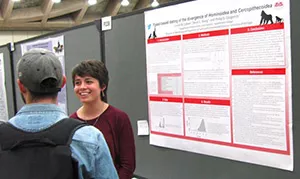Stephanie Kestelman '16 Presents Findings for U.N. Project on Trade and Development

When the family and friends of Stephanie Kestelman ’16 found out that she was co-authoring a paper with a professor, they were bedazzled. When they heard what it was about, though, they were bewildered.
“Some didn’t even know where Uzbekistan was, let alone why I was so interested in its cotton sector,” says the Honors economics major from São Paulo, Brazil, laughing.
An obscure topic, agrees Kestelman, but one for which she ginned up excitement, in collaboration with Stephen Golub, Franklin and Betty Barr Professor of Economics. The duo presented their joint findings at the annual meeting of the Central Eurasian Studies Society (CESS) in Washington, D.C., earlier this month over fall break.
“It was kind of scary up there,” she says. “Not just trying to impress the people who were listening, but to not disappoint my professor who put so much effort into this with me. But by the end, I was so glad I did it and so grateful for the opportunity.”
Their paper originated as a project for the United Nations Conference on Trade and Development. Then Golub and Kestelman consulted with an economist from the USDA who had written about Uzbekistan’s cotton industry and they decided to expand the paper and submit a proposal to the CESS.
The co-authors worked through the different iterations of the paper, commenting on and editing each other’s contributions.
“Stephanie’s help was critical,” says Golub, noting her resourcefulness with research and skills with data analysis and writing.
“[Golub] was great at giving me feedback and taking the research in this direction or that direction,” adds Kestelman. “But the main thing I appreciated was him trusting me to do the work.”
Kestelman hoped to collaborate on research with a professor while at Swarthmore, but she wasn’t about to sit around for an opportunity. She expressed interest for "any project that came onto [Golub’s] desk," then she jumped at the Uzbekistan study.
“It didn’t just happen,” she says. “I worked really hard to go after it and show that I was capable of the responsibility.”
Kestelman steadily grasped the nuance of the Uzbekistan cotton sector, which is rife with labor and environmental abuses and is more of a centralized system than most economic theory advises. Google Translate helped her to decipher information from Russian, and other researchers throughout the U.S. provided information.
“I was a little surprised by the openness of the researchers to take time out of their days to talk to a student,” she says.
At the CESS conference, Kestelman presented their findings on cotton value changes and environmental issues that imperil the sector. She and Golub will continue work on the paper in the hopes of publishing it.
His work with Kestelman represents the sixth report Golub has done for the United Nations in the last 10 years, all with student co-authors. He has two more underway: one on Angola with Varun Prasad ’16, an Honors economics and mathematics major from Mumbai, India, and one on labor markets in Africa with Hanyu Chwe ’16, an Honors economics major from Los Angeles, Calif.
“The U.N. has been very pleased with the work we have done for them at Swarthmore," Golub says, "and keep coming back to me with new projects.”



